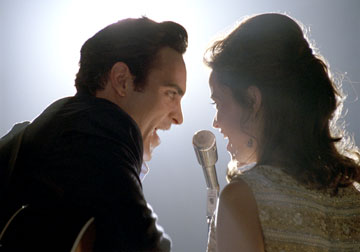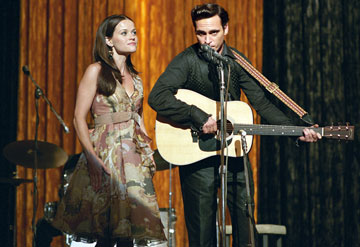

Near the beginning of Walk the Line, Sam Phillips (Dallas Roberts, A Home at the End of the World) admonishes a young Johnny Cash (Joaquin Phoenix, Ladder 49, Hotel Rwanda) about his audition. Phillips can see talent, but Cash's music and performance is not original. It's just like everything else out there, and who wants to hear that? Phillips wants Cash to get to the essence of his music. If he only had one song to perform that would tell the world who Johnny Cash was, what would that song be? Walk the Line falls into the former category. Cash is an iconic figure in American music. His romance with June Carter is one of the great love stories of modern music, and their marriage brought him into one of America's great musical families, a legacy that continued with their children. He was a towering role model for artists in the fields of Rock and Country, and was still making relevant music shortly before his untimely death in 2003, including a well-regarded cover of Nine Inch Nail's Hurt.
Carter was his salvation. She was a music star all of his life, and Cash used to listen to her on the radio when he was a child. Meeting her was a dream, and both felt an instant attraction, although both were married. Cash tried to act upon those feelings, but Carter often rebuffed him. As Cash's fame rose, he spent more time away from home, and more time Carter, whom he went on tour with. Cash's devotion to Carter seems almost childlike at times - he stares at her as if she was some untouchable treasure. As he sinks into despair, Carter is the person who is there for him. While this is interesting, and where the heart of the movie comes from, writer/director James Mangold (Identity, Kate & Leopold) and co-writer Gil Dennis (Without Evidence, On My Own) know that the strength of the film comes from Cash singing.
To support this end, they add many concert scenes of Cash, his band, and even some of his contemporaries. It is even more interesting to note that Phoenix did all of the singing. In person, he is soft spoken and shy, but he does a great impression of Cash's deep singing voice. He doesn't sound exactly like Cash, but he comes really close. Phoenix is one of those actors who can invest a lot of emotion, especially the more troubled ones, into his characters. He really makes the audience believe that he worships the ground that Carter walks on. Witherspoon is decent, but really isn't given that much to do. She plays off Phoenix's performance. And her singing voice is not the greatest. Another nice thing that Mangold did was to cast actual musicians in some of the smaller roles. Shelby Lynne, Shooter Jennings, and Waylon Malloy Payne all make small appearances. They don't lend much to the actual movie, but do give it a sense of credibility.